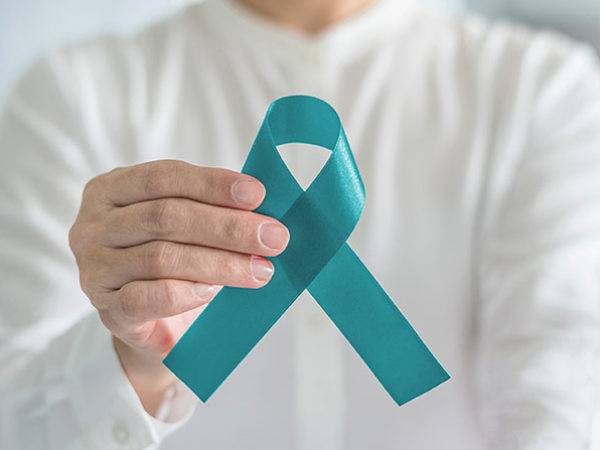Cervical cancer is the fourth most common type of cancer occurring in females globally, with an estimated 604 000 new cases and 342 000 deaths in 2020. Yet, it is disturbing to note that many females in Pakistan have limited knowledge regarding this cancer in terms of risk factors, screening, symptoms, and treatment.
According to a study conducted by researchers in Karachi, out of the 388 Pakistani females interviewed, only 51.3% were simply aware of the term ‘cervical cancer’, and even less knew about its related vaccination and the important practice of regular screening. This led them to conclude that ‘most of the participants had insufficient overall knowledge about cervical cancer, HPV, Pap smear test, and HPV vaccination, highlighting the need for mass education through health professionals and media’ (Riaz L, Manazir S, Jawed F, Arshad Ali S, and Riaz R. Knowledge, Perception, and Prevention Practices Related to Human Papillomavirus-based Cervical Cancer and Its Socioeconomic Correlates Among Women in Karachi, Pakistan. Cureus. 2020 Mar 5). Hence, only through increased awareness and employment of screening tests and vaccination, will we be able to control this deadly malignancy.
Cervical cancer is essentially a slow-growing cancer formed in the tissues of the cervix, separating the uterus and vagina. Most cases are caused by the Human Papillomavirus, a sexually and non-sexually transmitted infection. It is vital for females at the age of 21 to begin regular screening tests to detect cell changes or abnormalities: Pap smear tests every 3 years and the Human Papillomavirus test every 5 years. This is because it aids in possible early diagnosis of cell changes leading to treatment. Furthermore, vaccinating females against HPV from the ages of 9 to 12 is ideal and is also recommended until the age of 26. This vaccination serves to prevent new HPV infections but does not mean one stops getting screened regularly. Smoking, the Human Immunodeficiency virus, giving birth to three or more children, and several sexual partners all increase the risk of cervical cancer.
There are many symptoms of cervical cancer which may indicate an immediate need for a doctor’s appointment. In its early stages, it has little to no symptoms, however advanced cervical cancer is known to cause abnormal bleeding from the vagina, heavier menstruation, pelvic pain, bleeding after menopause and pain during intercourse. Once diagnosed, cervical cancer can be treated in various ways, depending on how far it has spread; this includes the surgical removal of cancer tissue, and chemotherapy and radiation therapy to kill the cancerous cells. Each type of treatment has its own benefits and side effects which are better discussed with your doctor.
This article intends to raise awareness among mothers and adolescent girls of the threat of cervical cancer and how easy it is to prevent.
The author is a student of A-1, LGS Defence, Lahore. A High achiever and O-level World Distinction Holder in Math and Biology.
According to a study conducted by researchers in Karachi, out of the 388 Pakistani females interviewed, only 51.3% were simply aware of the term ‘cervical cancer’, and even less knew about its related vaccination and the important practice of regular screening. This led them to conclude that ‘most of the participants had insufficient overall knowledge about cervical cancer, HPV, Pap smear test, and HPV vaccination, highlighting the need for mass education through health professionals and media’ (Riaz L, Manazir S, Jawed F, Arshad Ali S, and Riaz R. Knowledge, Perception, and Prevention Practices Related to Human Papillomavirus-based Cervical Cancer and Its Socioeconomic Correlates Among Women in Karachi, Pakistan. Cureus. 2020 Mar 5). Hence, only through increased awareness and employment of screening tests and vaccination, will we be able to control this deadly malignancy.
Cervical cancer is essentially a slow-growing cancer formed in the tissues of the cervix, separating the uterus and vagina. Most cases are caused by the Human Papillomavirus, a sexually and non-sexually transmitted infection. It is vital for females at the age of 21 to begin regular screening tests to detect cell changes or abnormalities: Pap smear tests every 3 years and the Human Papillomavirus test every 5 years. This is because it aids in possible early diagnosis of cell changes leading to treatment. Furthermore, vaccinating females against HPV from the ages of 9 to 12 is ideal and is also recommended until the age of 26. This vaccination serves to prevent new HPV infections but does not mean one stops getting screened regularly. Smoking, the Human Immunodeficiency virus, giving birth to three or more children, and several sexual partners all increase the risk of cervical cancer.
There are many symptoms of cervical cancer which may indicate an immediate need for a doctor’s appointment. In its early stages, it has little to no symptoms, however advanced cervical cancer is known to cause abnormal bleeding from the vagina, heavier menstruation, pelvic pain, bleeding after menopause and pain during intercourse. Once diagnosed, cervical cancer can be treated in various ways, depending on how far it has spread; this includes the surgical removal of cancer tissue, and chemotherapy and radiation therapy to kill the cancerous cells. Each type of treatment has its own benefits and side effects which are better discussed with your doctor.
This article intends to raise awareness among mothers and adolescent girls of the threat of cervical cancer and how easy it is to prevent.
The author is a student of A-1, LGS Defence, Lahore. A High achiever and O-level World Distinction Holder in Math and Biology.






